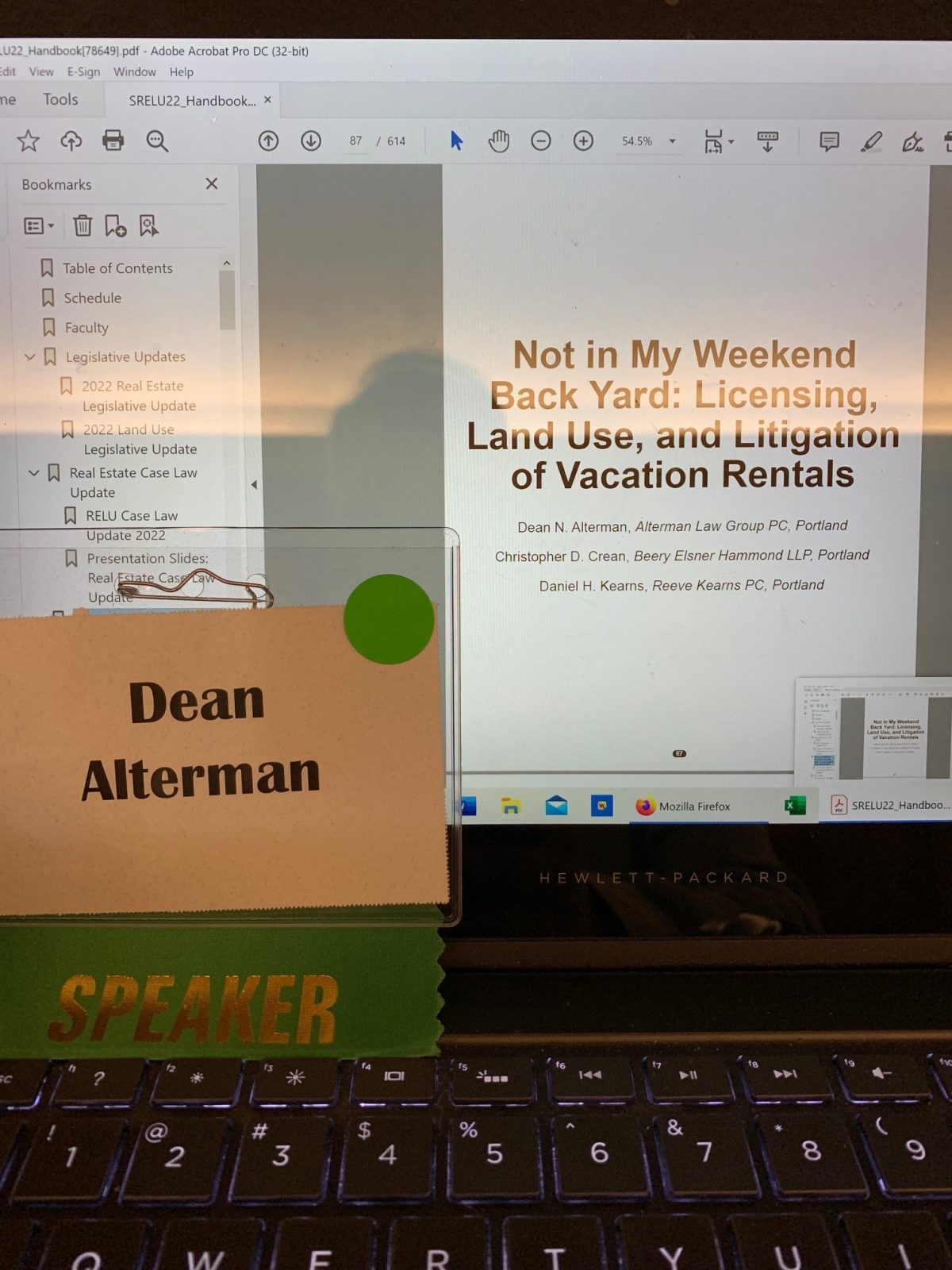
Oregon law authorizes a party to litigation who is claiming an interest in someone else’s real estate to record a notice of pending litigation – a lis pendens – in the real estate records. The lis pendens gives notice to prospective purchasers and lenders that the lawsuit may affect the title to the property. The particular statute, ORS 93.740, begins with “In all suits in which the title to or any interest in or lien upon real property is involved, affected or brought in question, any party thereto” may record a notice of the pendency of the action, which puts purchasers and lenders on notice “of the rights and equities in the premises of the party filing the notice.”
Until this September, most Oregon real estate lawyers understood that the litigant who records the notice must be asserting some interest in the real property, such as ownership, a lien, a leasehold, or an option. A plaintiff who was not claiming any direct interest in someone else’s property couldn’t record a lis pendens against the defendant’s property.
In September the Oregon court of appeals changed our common understanding with its opinion in Indian Ridge I v. Lenahan, 314 Or App 715 (2021). The court held that a landowner who was challenging a neighbor’s land division through a writ of review could record a lis pendens to put the writ of review into the real estate records, even though the plaintiff was not himself asserting any right in the neighbor’s property – and even though the defendant was the county, not the property owner.
Here’s what happened. In 2014, the owner of the “Hayes property” applied to partition the 150-acre tract into a 146-acre parcel and two 2-acre homesites. Lenahan owned nearby property and also held an easement over the Hayes property to convey water from the Wallowa River to Lenahan’s property for irrigation. Lenahan challenged the partition because he believed that developing the homesites might affect his water rights. Wallowa County approved the partition. Lenahan filed a petition for review with the Land Use Board of Appeals, properly naming Wallowa County as the respondent. LUBA denied Lenahan’s petition for review for lack of jurisdiction and transferred it to the Circuit Court, to be handled as a writ of review under ORS 34.010.
The court of appeals describes what happened next:
While the writ of review proceeding was underway, the Hayes property went into foreclosure. Anticipating that the property could be sold at auction, respondent filed a notice of lis pendens in Wallowa County on April 28, 2017. The notice identified the writ of review proceeding by case number, listed the parties to the proceeding as Lenahan (as petitioner) and Wallowa County (as respondent), identified the Hayes property as the real property affected, and described the object of the action as “Appeal of Wallowa County’s decision (Order 2015-017) to approve a tentative plat (LP#14-13) to create two two-acre parcels pursuant to Ballot Measure 49 Final Order H129386.”
The new owner of the Hayes property, Indian Ridge, petitioned to have the lis pendens declared invalid. The circuit court granted Indian Ridge’ petition because Lenahan was not, in the trial court’s words, making any “claims against any interest or lien” in the property under the writ of review.
Lenahan appealed. The court of appeals reversed the circuit court and held that ORS 93.740 entitled Lenahan to record a lis pendens.
The court of appeals identified the question as whether the writ of review was a suit “in which the title to or any interest in or lien upon real property [was] involved, affected, or brought in question.” Lenahan contended that the writ of review would affect an interest in the property, and that as Lenahan was the plaintiff, Lenahan could record the lis pendens.
Indian Ridge argued that Lenahan could not record a lis pendens against the Hayes property (now Indian Ridge’s property) because Lenahan did not claim any interest in the Hayes property. The suit would affect only whether the Hayes property was one parcel or three parcels, but would not grant Lenahan any rights in the Hayes property.
The court of appeals explained that although ORS 93.740 allows parties to litigation involving interests in real property to record a notice to establish their priorities in the real property, “it does not follow that the only purpose of lis pendens is to establish claim priority.” The court included in the statute’s purposes that of giving prospective purchasers notice of matters affecting the property, such as the dispute between Lenahan and Indian Ridge over the partition application.
To again quote the court: “[The lis pendens statute] is not written so narrowly that only someone making a claim against the property may file a notice of lis pendens. Rather, it expressly permits the filing of a notice when any property interest is involved, affected, or brought in question.”
However, the court’s opinion barely mentions three unusual facts about this case. First, people who claim an interest in real property name the property owner as a defendant, but the property owner, Indian Ridge, was not a party to the underlying case because Lenahan had sued the county to overturn a county decision; he had not sued the landowner. Second, no matter how the case ended, Indian Ridge would still own the Hayes property free of any claim of Lenahan. All the case would do is determine whether the property was one legal parcel or three legal parcels. Third is that the statute says that the lis pendens is notice to prospective purchasers “of the rights and equities in the premises of the party filing the notice,” but Lenahan, who filed the notice, id not claim any right or equity in the Indian Ridge property. (No one argued against his easement right for the river water.)
We are left with a dissatisfying result. The court of appeals held that the public benefits when litigants can use ORS 93.740 to tell the world that about challenges to partitions and land use actions, and yet it’s hard to read the words of the statute and conclude that the legislature intended to give people who aren’t claiming an interest in real estate and who aren’t suing the property owner to record a lis pendens against the property.


